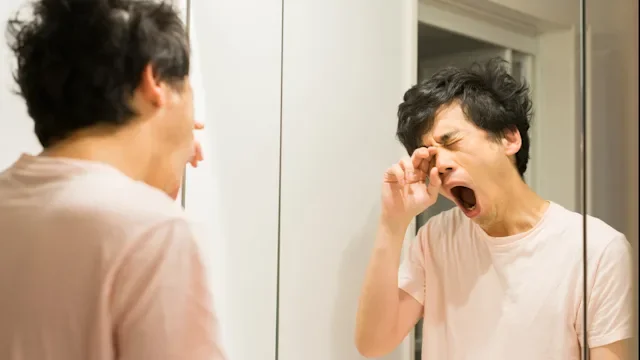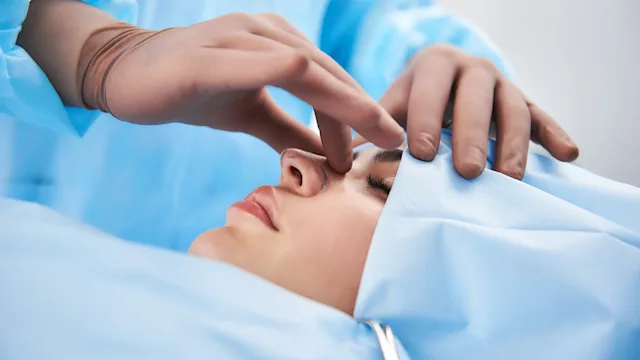Key takeaways:
Exploding head syndrome is a sleep disturbance (parasomnia) like sleepwalking or sleep paralysis.
People with exploding head syndrome have the perception of hearing a loud, scary noise during sleep. This causes a sudden and startling sleep disruption.
Episodes of exploding head syndrome aren’t dangerous. Most people don’t need treatment and can manage nighttime awakenings with self-care and good sleep hygiene.
A good night’s sleep is essential for a healthy mind and body. Sleep impacts every part of your body, from your brain to your heart and your immune system. So, when something interferes with your sleep, it’s normal to be concerned.
Exploding head syndrome is a mysterious sleep disturbance. And it’s more common than you might think. Let’s take a closer look at this sleep condition.
What is exploding head syndrome?
Exploding head syndrome is a parasomnia. Parasomnias are unwelcome events that happen as you fall asleep or first wake up. They can also happen during sleep.
Search and compare options
People who experience parasomnias may have unwanted movements during sleep — like sleepwalking, talking, or screaming. They may also see or hear things that aren’t really there. Parasomnias can be very frightening.
Exploding head syndrome was first described over 150 years ago, but it only got an official medical name in 2005. And while the name sounds scary, the condition isn’t dangerous.
Advocates and medical professionals are pushing for a new name: episodic cranial sensory shock. It doesn’t roll off the tongue quite as well. But it is a better description of what people experience.
Exploding head syndrome isn’t uncommon. One recent study found that 10% of people experience exploding head syndrome. But the condition might be more common, since scientists believe most people don’t seek help for their symptoms and are never diagnosed.
What does exploding head syndrome feel like?
People with exploding head syndrome hear a loud, unpleasant noise while they’re asleep, as they are drifting off, or while they’re first waking up. The noise always startles people awake.
The exact noise varies from person to person, but it only lasts about a second.
Read more like this
Explore these related articles, suggested for readers like you.
Some people hear:
A boom like fireworks going off
A bang like a pistol shot
A crash like a door slamming
An electrical buzz, snap, or fizzle
Some people perceive that loud sound as happening directly inside their own head, hence the name exploding head syndrome. The sensation isn’t painful. But it is frightening. People often experience additional symptoms after the episode like:
Sweating
A fast heart rate
Heaviness in the chest or stomach
Feeling overly warm
Shortness of breath
A sense of fear
Researchers aren’t sure whether these symptoms are part of the parasomnia or are part of a fear response.
What causes exploding head syndrome?
Researchers don’t know what causes exploding head syndrome.
But some researchers believe it’s due to changes in brainstem activity. These changes overexcite certain nerves and lead to the unpleasant sensations.
Other researchers are looking at whether medical conditions like migraines or ear problems can lead to exploding head syndrome.
Researchers haven’t been able to find anything that sparks episodes of exploding head syndrome, either. For a while, it was thought that conditions like stress or insomnia could trigger exploding head syndrome. But research hasn’t shown any definite link.
The exact cause of exploding head syndrome will likely remain a mystery for some time.
How do you diagnose exploding head syndrome?
There’s no test for exploding head syndrome. Your healthcare provider can diagnose you with exploding head syndrome if all three of these are true:
You hear a loud sound during sleep, when you’re falling asleep, or when you first wake up.
The sound frightens you and makes you wake up suddenly.
You don’t feel any pain during the episode.
Your provider will also ask you about your overall sleep quality. They may ask you to complete a sleep study to make sure you don’t have another sleep condition like sleep apnea or insomnia. Many people with exploding head syndrome also discover they have another sleep condition when they seek help for their symptoms.
How do you treat exploding head syndrome?
Most people don’t need any treatment for exploding head syndrome. The condition isn’t painful or dangerous. And most people with exploding head syndrome don’t have symptoms every night. The events may happen a few times a week or a few times a month. They may also go away for weeks or even months and then start up again.
All this means that many people can manage their symptoms by following good sleep hygiene. Some tips for healthy sleep include:
Keeping a consistent bedtime and wake up time
Keeping your sleep space dark, cool, and quiet
Avoiding screens for at least an hour before going to sleep
Avoiding large meals, caffeine, and alcohol right before bedtime
Getting exercise during the day
If you have sleep apnea or insomnia, getting treatment for your sleep condition may also lessen the number of events you experience.
If these tips don’t work, or you’re feeling scared or anxious about falling asleep, talk to your healthcare provider. There are medications that can be used off-label for exploding head syndrome, including:
Amitriptyline (Elavil)
Duloxetine (Cymbalta)
Nifedipine (Procardia XL)
Clonazepam (Klonopin)
Clobazam (Onfi)
These medications may lower the number or episodes you experience or make the experiences less intense. There haven’t been any studies to see if these medications will help everyone with exploding head syndrome. But some people have found success with these medications.
If other options haven’t worked for you and exploding head syndrome is keeping you from sleeping, ask your healthcare provider about whether treatment could help.
The bottom line
Exploding head syndrome is a sleep disturbance (or parasomnia). People with this condition hear a loud noise while they’re asleep or in twilight between sleep and wakefulness. The noise is frightening and startles people awake. Exploding head syndrome isn’t dangerous or painful. It also doesn’t happen every night. Most people are able to manage their symptoms with good sleep hygiene. But some people need additional help to manage their symptoms with medications.

Why trust our experts?


References
Centers for Disease Control and Prevention. (2022). Tips for better sleep.
Denis, D., et al. (2019). Associations between exploding head syndrome and measures of sleep quality and experiences, dissociation, and well-being. Sleep.
Khan, I., et al. (2022). Exploding head syndrome. StatPearls.
Pirzada, A. R., et al. (2020). Exploding head syndrome: A case series of underdiagnosed hypnic parasomnia. Case Reports in Neurology.
Sharpless, B. A. (2014). Exploding head syndrome. Sleep Medicine Reviews.
Sharpless, B. A. (2015). Exploding head syndrome is common in college students. Journal of Sleep Research.
Sharpless, B. A. (2018). Characteristic symptoms and associated features of exploding head syndrome in undergraduates. Cephalalgia: An International Journal of Headache.


















